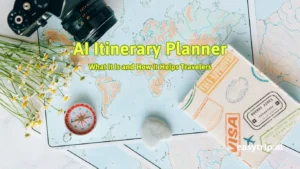Introduction
Planning a vacation can be both thrilling and daunting. With the right vacation trip planner, you can easily organize your journey, ensuring a smooth and enjoyable experience. This guide covers essential tips and tools for planning your perfect getaway, from booking to exploring your destination.
Choosing the Right Destination
Start by determining your travel goals. Are you looking for relaxation, adventure, culture, or perhaps a mix? Consider factors like weather, travel advisories, and seasonal activities to choose the perfect destination for your vacation. For instance, if you seek relaxation, you might opt for a beach destination like
Maui or the
Maldives. If adventure is your calling, consider exploring the rugged landscapes of
Patagonia or the vast savannas of
Kenya.
When considering cultural experiences, destinations like
Kyoto in Japan or
Rome in Italy offer rich histories and vibrant local traditions. It’s important to align your destination choice with the type of experiences you value most. Furthermore, researching local festivals and events can add a unique flavor to your trip. For example, visiting
Rio de Janeiro during Carnival or
New Orleans during Mardi Gras can provide unforgettable cultural immersion.
Setting a Budget
Establish a realistic budget considering all costs—transportation, accommodation, food, entertainment, and unforeseen expenses. Use budgeting apps and online cost calculators to help manage your finances effectively. Tools like
Mint or
YNAB (You Need A Budget) can help you track your spending and stay within your financial limits.
To save on costs, look for deals and discounts on flights and accommodations through platforms like
Skyscanner and
Booking.com. Additionally, setting aside a contingency fund for unexpected expenses can prevent financial stress during your trip. Consider off-season travel for lower prices and fewer crowds, and always compare prices across multiple websites before making a booking.
Booking Flights and Accommodations
Book flights and accommodations well in advance to secure the best rates. Use trusted booking platforms and check for flexible cancellation policies. Consider alternative lodging options like vacation rentals to enhance your experience. Websites like
Airbnb and
VRBO offer unique stays that can often provide more comfort and space than traditional hotels.
When booking flights, consider using fare comparison tools like
Google Flights or
Kayak to find the best deals. Signing up for airline newsletters and fare alerts can also help you stay informed about price drops and special promotions. For accommodations, read reviews carefully to ensure the quality and safety of the place you’re booking. Don’t forget to factor in the location’s convenience relative to the attractions you plan to visit.
Creating an Itinerary
An effective itinerary balances structured activities with downtime. Utilize itinerary planning tools to schedule your days, allowing for both sightseeing and spontaneous exploration. Include local events or festivals to enrich your travel experience. Tools like
TripIt or
Google Trips can help you organize your plans and keep all your booking details in one place.
Start by listing the top attractions and activities you don’t want to miss, then allocate time for each. Be realistic about what you can accomplish in a day to avoid overpacking your schedule. Leave room for relaxation and unplanned discoveries, as these often become the highlights of your trip. Consider reaching out to locals or using platforms like
Meetup to join community events and meet new people.
Packing Essentials
Pack according to your destination’s climate and planned activities. Create a checklist to ensure you don’t forget essentials like travel documents, appropriate clothing, gadgets, and personal items. Always pack light to enhance mobility and reduce stress. A tool like
PackPoint can help you generate a customized packing list based on your destination and activities.
For a beach vacation, pack swimwear, sunscreen, and lightweight clothing. For colder destinations, layers, thermal wear, and waterproof gear are essential. Don’t forget travel-sized toiletries, a first aid kit, and any medications you may need. Consider packing a power bank for your devices and a universal adapter for international travel. Using packing cubes can help keep your luggage organized and save space.
Exploring Local Cuisine
Research local dining options and make reservations in advance for popular eateries. Explore street food and local markets for an authentic culinary experience, balancing dining out with in-room meals to stay within budget. Websites like
Yelp or
Zomato can help you find highly-rated local restaurants and read reviews.
Before your trip, make a list of must-try dishes and regional specialties. For instance, savoring sushi in Tokyo, tapas in Barcelona, or pasta in Rome can add a delicious layer to your travel experience. Don’t shy away from street food; it often provides an authentic taste of the local culture at a fraction of the price of restaurant meals. Participating in a local cooking class can also enhance your culinary adventure, teaching you how to recreate your favorite dishes at home.
Staying Safe and Healthy
Prioritize your health and safety by familiarizing yourself with local healthcare facilities and travel insurance details. Carry a basic first aid kit, medications, and copies of your prescriptions. Always follow local safety guidelines and emergency procedures. Websites like
CDC Travel and
World Health Organization offer up-to-date information on travel health advisories.
Ensure your travel insurance covers health emergencies, trip cancellations, and lost luggage. Know the location of the nearest hospital or clinic and keep emergency numbers handy. For international travel, consider getting vaccinations recommended for your destination. Staying hydrated, practicing good hygiene, and eating at reputable places can help prevent common travel illnesses.
Navigating Transportation
Understand local transportation options such as public transit, car rentals, and taxis. Download relevant apps for real-time schedules and ticket bookings to facilitate smooth travel within your destination. Apps like
Citymapper and
Uber can be invaluable for navigating unfamiliar cities.
Research the most efficient and cost-effective ways to get around. In some cities, a public transit pass may be more economical than frequent taxi rides. For longer stays, renting a car could provide flexibility and convenience. Always check local driving laws and requirements if you plan to drive. For eco-friendly travel, consider bike rentals or walking tours to explore your destination.
Documenting Your Trip
Keep a travel journal or blog to document your experiences. Share your journey through photos and stories on social media to keep family and friends updated and preserve your memories. Apps like
Day One or
Travel Diaries can help you create a digital journal with text, photos, and maps.
Take time each day to jot down your thoughts and impressions. Capture moments that stood out, interactions with locals, and the sights and sounds of your journey. Sharing your experiences online can also provide tips and inspiration for other travelers. Creating a photo album or a travel video can be a fun way to relive your adventures and share them with others.
Conclusion
Using a vacation trip planner can transform the often overwhelming task of trip planning into an easy, enjoyable process. With careful preparation, you can ensure a vacation that is both rewarding and relaxing. By leveraging the right tools and resources, you can maximize your travel experience, creating memories that will last a lifetime. Whether it’s choosing the perfect destination, budgeting wisely, booking smart, or exploring with confidence, a well-planned trip is the key to a successful and enjoyable vacation.
TL;DR: Streamlining Vacation Planning
Efficiently plan your vacation by choosing the right destination, setting a budget, booking early, packing smartly, and balancing planned activities with downtime. Utilize technology to enhance your travel experience and keep a record of your adventures.
FAQ Section
1.
What are the best free vacation trip planners available online?
Platforms like Google Trips, Roadtrippers, and TripIt offer robust features for planning at no cost.
2.
How can I ensure my vacation is environmentally friendly?
Choose sustainable travel options, support local businesses, avoid single-use plastics, and respect natural and cultural sites.
3.
Can I plan a vacation last minute using these tools?
Yes, many trip planners are designed for both advance and last-minute planning, offering features that cater to quick decision-making and bookings.
Seasonal Tips in 2024
- Winter Wonderland Escapes: Discover the top destinations for snow lovers, from luxury ski resorts in the Alps to cozy cabin retreats in the Rockies.
- Spring Blossom Tours: Experience the vibrant colors and fragrances of cherry blossoms in Japan or the tulip fields in the Netherlands during peak bloom season.
- Summer Beach Getaways: Explore the best sandy shores and crystal-clear waters in tropical paradises like the Maldives and Hawaii.
- Autumn Foliage Spectacles: Enjoy breathtaking views of autumn colors in renowned spots like New England, USA, or the wine regions of Bordeaux, France.
- Unique Cultural Festivals: Plan your visit around world-famous events like Brazil’s Carnival, Germany’s Oktoberfest, or the Diwali Festival in India.
- Off-Season Hidden Gems: Take advantage of lower prices and fewer crowds by visiting popular destinations in their off-peak times, enhancing your overall travel experience.
Closing Remarks
Thank you for exploring how to effectively use a vacation trip planner for your travels. Whether you’re a novice or an experienced traveler, these tools and tips will help you craft a journey that’s as seamless as it is enriching. Happy travels!








